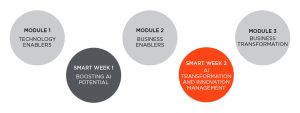
In an era where artificial intelligence is rapidly reshaping business models and competitive landscapes, it is essential to rely on skilled managers capable of navigating this evolution and ensuring the future of organizations.
The Executive Master in Artificial Intelligence for Business provides participants with a solid set of skills to leverage the potential of artificial intelligence in the business context.
Through a transformative learning journey, participants will acquire the necessary knowledge to assess the economic, financial, legal, and ethical implications associated with AI implementation and cutting-edge tools to develop effective strategies and manage the risks associated with this revolutionary technology.
The Master is designed for visionary entrepreneurs, successful managers, and professionals from all business sectors who wish to harness the power of AI in their career path. It also serves as an ideal platform for consultants aiming to acquire advanced skills and state-of-the-art tools to enhance organizations through transformative processes.
The program lasts for 12 months, with a total of 33 classroom days in a part-time evening format, with two online sessions per week on Tuesdays and Thursdays from 6:30 PM to 9:30 PM CEST. It is organized into 15 core courses, featuring classroom lectures, real cases, and discussions; Focus Sessions on Human in the Loop, Algorethics, AI & Sustainability, ESG, and Open AI; 2 Smart Weeks on Campus experiences to interact with colleagues, faculty, and the entire BBS (Business School) community: Leadership Talks and Company Visits will provide an opportunity to expand and strengthen one’s network.
With a flexible format, the Master is designed for those who do not want to put their careers on hold but aspire to grow professionally with a specific and immediately applicable learning program.
New artificial intelligence and automation technologies are rapidly transforming business contexts. Innovation is the watchword: programming, automation, and artificial intelligence are the keys to the near future in every field of business.
To keep up with market demands, don’t miss the opportunity to attend the Executive Master in AI for Business.
Accreditation

Bologna Business School is EQUIS – EFMD Quality Improvement System accredited, one of the most important international quality assessment and continuous improvement systems for Schools of Management and Business Administration.
Structure
The study methodology is characterized by the flexibility of online sessions divided in 3 modules integrated by 2 Smart Weeks on Campus. Each module focuses on specific topics and includes online lectures, testimonials, practical activities, and a final assessment to evaluate participants’ level of learning.

Core courses
Fifteen core courses divided in 3 modules provide specific tools and skills. The teaching activity includes lectures, case studies and discussion opportunities.
Leader’s Corner
5+ opportunities for discussion with international managers. The purpose of the meeting is to share experiences, business cases and best practices.
Focus Sessions
5 meetings with managers, experts, and professionals on topics such as: AI & Sustainability, Generative AI, No Code, SandBoxAQ and From AI to Product: XOOTS case study.
Smart Weeks on Campus
Two on Campus (Bologna) Smart Weeks of 4 days each will allow the participants to strengthen the value of personal interaction with the classmates and faculty. You will take part in Challenge-Based Workshops, Leadership talks, and Company Visits at prestigious companies that are part of the School’s Business Network.
Company Visits
Company visits, which will take place during the in-person sessions, will allow participants to engage with excellent companies in the field of AI and technology.
Project work
Project works developed by participants in small groups will enable them to put the knowledge they have gained into practice. The aim is to provide valuable insights, actionable strategies, and a functioning AI solution to enhance business operations.
COURSES
The course will provide an introductory overview of the various existing AI techniques, putting them into an historical context
which is essential to understand how we arrived to the recent sensational exploit of AI applications and what can we expect from the near future. We will discuss industrial applications with their opportunities and challenges, touching also on some social, economic and ethic implications which will be deepened in other courses. A specific focus will be on the interaction between AI and robotics, given the relevance of artificial intelligence applications for manufacturing and industrial automation.
Gabbrielli Maurizio
Saffiotti Alessandro
Getting value from data requires the design of a composite chain that begins from a strategic vision to the implementation, exploitation and continuous operation management. This course offers a preliminary and systemic vision to the use of the latest methodologies and techniques for extracting useful knowledge that will be explored in other courses of the Master.
Colajanni MicheleThis course aims to provide participants with a comprehensive understanding of machine learning methodologies and their applicability in various business sectors. Consisting of three intensive lectures, the course covers fundamental machine learning principles, advanced learning paradigms, different data representations, and essential business analytics tools. The course also includes real-world case studies to ensure practical applicability.
Computer Vision is at the heart of the AI revolution. Machines nowadays can not only see better than ever but also generate realistic visual content spanning images, videos and 3D assets. We will walk through ideas and applications, shedding light on how computer vision may be deployed in controlled environments, e.g. in manufacturing, “in the wild”, e.g. in assisted/autonomous driving, as well as to generate cool stuff for applications largely yet to come.
Di Stefano LuigiWith this course, the candidates will understand Large Language Models, delving into the fundamentals of large language models, with reference to prominent language models such as GPT-3, BERT, and more. Will be offered an overview about LLM-based applications and their industry relevance, exploring diverse real-world applications of large language models across industries such as insurance, life science, finance, customer service, content generation, and more. They will navigate the Technological Landscape, through the assessment the current state-of-the-art and ongoing advancements in the field of large language models, learning about the available models, platforms, and providers to make informed decisions about integration and implementation. Will gain insights into the challenges and best practices associated with adopting large language models in business processes, identify potential roadblocks and develop effective strategies for successful integration. And finally will explore emerging trends and future developments in the realm of language models and artificial intelligence.
Belli AndreaThe first part of this course provides the basic knowledge of the main concepts and principles of cybersecurity (e.g., risk, risk assessment and evaluation, attacks and their typical structure, resources, human component). Some specific aspects regarding the methodology, the technology and the behavior (i.e., operational security) will be considered mainly through a case-study approach. The most relevant outcome of this part of the course will be a better awareness of the main cybersecurity problems of current systems (and future AI applications), all the while acquiring a proper cybersecurity-aware mindset.
The second part of the course introduces the main components of the ICT infrastructure, both considering the computational infrastructures (e.g., CPU, GPU, TPU, FGPA, ASICS) and the networking components. The cloud computing and edge computing architectures such as quantum computing will be sketched and their challenges will be discussed.
Technical features will be considered while also taking in account the cost-related aspects.
D’Angelo GabrieleThe course will introduce participants to the value of using immersive paradigms in data analytics. It will walk through the principles underlying the design of immersive analytics systems, exhibiting how such type of systems may facilitate collaboration and change the process of data analysis.
Gustavo MarfiaEthics and Politics
The module focuses on the family of AI narratives that shape public perceptions of the relationship between ethics, politics, law and technology.
These include AI ethics, anthropomorphism, value alignment, the principle of technological inevitability, the myth of technological exceptionalism, the principle of innovation, and the myth of the legal void. Indeed, falling prey to such narratives leads to poor business decisions.
Law for AI
The course will provide an overview of the main legal issues related to the creation and use of AI systems in many fields, with a focus on how such issues should lead companies to reconsider crucial aspects of their business strategies.
Specific attention will be paid to the duties imposed on businesses developing AI systems, especially focusing on the developments of laws and standards at EU level (e.g., the proposal for an Artificial Intelligence Act), as well as on companies employing AI in their business activities. The course will also deal with many of the aspects related to liability for damages caused by AI, from product liability to general civil and criminal liability rules. A specific focus will concern the legal implications of the use of AI-based automated decision-making systems by boards of directors or company managers (so-called “CorpTech”), as well as of the use of generative AI
Amidei AndreaRuffolo Ugo
Tafani Daniela
In the contemporary fast-paced and ever-evolving landscape of modern business, innovation is no longer a mere optional, but rather a categorical imperative for survival. No company, whether large incumbent businesses or early-stage startups, can afford not to master the discipline of innovation in a structured and rigorous way. Within this context, AI has emerged as a transformative force, reshaping not only how companies operate but also the fundamental dimensions of what they offer and how they organize themselves.
This course aims to provide participants with the skills and the knowledge necessary to manage AI from a business innovation perspective in a disciplined way, to understand, embrace, and harness the potential of AI to reshape the future of business.
Participants will learn how to assess the value of AI for business and recognize the different ways AI can revolutionize different aspects of business innovation, such as products, services, processes, organizational structures, and business models. The goal is to develop a clear understanding of the levels, stages and business contexts in which AI systems can generate innovation advantages. To this end, students will have the opportunity to analyze complex case studies to understand the risks and opportunities related to AI adoption, identify the main barriers to its diffusion and develop formalized strategies to overcome them.
In addition and building on the idea that AI should be focused on providing value to end-users, participants will learn how to assess whether AI solutions address the crucial needs of customers and other end users by helping them accomplish significant tasks or “get an important job done.” This user-centric perspective ensures that AI is not just a technological novelty but a meaningful asset that improves people’s lives and solves real-world problems.
Furthermore, the course offers participants to acquire the skills to prioritize AI opportunities effectively. They will follow a structured process that revolves around assessing organizational goals and winning aspirations, aligning AI initiatives with the overarching vision of the business.
By the end of this course, participants will be well-prepared to navigate the AI landscape and lead their organizations into a future where AI is an integral and value-driven component of their business strategy. “Reinventing Business with AI” is the gateway to understanding, embracing, and harnessing the potential of AI to reshape the future of business.
Balzan FrancescoMassa Lorenzo
The landscape of business decision-making has undergone a profound transformation, courtesy of artificial intelligence. This evolution has the potential to bring forth pivotal advantages—enhanced accuracy, heightened efficiency, and a remarkable ability to unravel intricate patterns. Integration of AI into the decision-making processes not only holds the potential to refine precision but also positions organizations to secure a competitive edge through well-informed, data-driven, and strategically sound decisions.
In the first part of the course, we address the critical trade-offs involved in adopting Machine Learning methods for decision-making in business contexts. The course equips participants with both conceptual and practical skills needed to assess the costs—both social and economic—against the tangible benefits that these systems bring to the realm of corporate innovation.
In the second part of the course, we address how Artificial Intelligence can be used for (combinatorial) optimisation, in alternative to, or in combination with, Machine Learning. We introduce the main features of the Constraint Programming paradigm and the MiniZinc language, to show how this approach can be used to build Intelligent Decision Support Systems.
This is not an abstract exercise. Through in-depth case studies, students dissect the real-world complexities associated with AI adoption, gaining insights into the nuanced landscapes of risks and opportunities. The curriculum demands an interdisciplinary mindset, where technical expertise aligns seamlessly with the practicalities of business strategy, fostering a robust understanding of how AI amplifies decision-making capabilities.
Implementation of AI projects is a challenge that passes through people, this needs conscious leaders, able to facilitate the work of heterogeneous teams and get the most out of people both in terms of problem finding and change making. We will use the discipline of emotional intelligence to embed the neuroscience of change and build on this scientific approach to arrive to an action model.
The course aims to provide the right tools and competences needed to become a change maker in organizations in particular how to increase the awareness of the impact of leadership, support the management of the ordinary resistance to create new patterns of action, communicate and collaborate in teams to obtain extra-ordinary results.
Ghini MassimilianoThis course is designed to review the changes in the world of work, focusing on how digitalization, big data and the spread of Artificial intelligence are leading to a profound transformation of organizational, human resources and competencies systems and processes.
Basic knowledge will be provided to conduct the analysis and definition of process and organizational model design and successful implementation in alignment with business strategy. Costs and benefits will be assessed, return on investment analyzed, as well as the impact of introducing AI solutions for human resource management in terms of organizational innovation, corporate culture and compliance
Bologna is located in the center of Emilia Romagna, third region in Italy by GDP, first by export value. Many companies in this area, which are industry leaders in the Automotive, Fashion, Packaging, Automatic Machinery, Food, Pharmaceutical, Ceramics and ICT & Software sectors, are part of the BBS business network.
During this 4-day residential at the BBS Campus in Bologna, you will meet managers and inspirational leaders who have designed and implemented successful AI-based projects for services, products, processes and business models innovation in different industries, you will participate in Challenge-Based Learning events during company visits, play Business Games with other participants.
Boscato CristianoValue creation is the relevant key success factor of long term business competitive advantage and managers are increasingly exploiting and exploring new business value creation opportunities. Management challenges are dealing with multiple critical levers that span from successful market and product decisions, pricing and process efficiency, to effective cost management and business model innovation. In this context performance understanding and performance management systems can play a relevant role into the unveiling, implementation and monitoring of value creation initiatives.
The course aims to provide the relevant knowledge for understanding organizations’ business financial performance and how business analytics can be applied to support the decision-making process of different business areas. Specifically, it focuses on the measuring and understanding of financial and value creation ratio, and on cost analysis and business analytics applications for supporting the decision-making process.
Supino EnricoThis course is designed to empower participants with a profound grasp of digital transformation strategies and their relevance across diverse business domains. Over the span of three dynamic sessions, you’ll delve into fundamental principles of digital transformation, explore advanced strategies, examine varied data representations, and master essential tools for business analytics. Real-world case studies will be integrated, ensuring you can apply your knowledge effectively in practical scenarios.
Meoli Azzurra
This course is designed to provide participants with an understanding of how artificial intelligence (AI) and machine learning (ML) can be used to create value in various business contexts. In this course, participants will learn how to identify opportunities to apply AI and ML in different business areas, such as marketing, finance, operations, and customer service.
Esposito MarkThe project work is developed in groups and on real cases (Companies from the BBS Business Network or companies proposed by participants). It is a comprehensive endeavor involving two distinct phases. In the first part, we focus on analyzing a specific business challenge and identifying AI-based solutions. The second part is dedicated to the practical development and implementation of an AI prototype to address the identified challenge. Throughout the project, we aim to provide valuable insights, actionable strategies, and a functioning AI solution to enhance business operations.
Boscato Cristiano
Faculty
Faculty members at Bologna Business School work together offering outstanding teaching standards. An international and interdisciplinary approach is guaranteed by a joint team of distinguished national core professors, adjunct, visiting professors, guest speakers and top managers.
-
Andrea Amidei
Adjunct professor
Department of Computer Science and Engineering
-
Francesco Balzan
Expert in Innovation Processes and Digital Transformation
Z-Inspection
-
Andrea Belli
Head of R&D
expert.ai
-
Cristiano Boscato
CEO
Dinova
-
Michele Colajanni
Full Professor of Computer Engineering
University of Bologna
-
Gabriele D'Angelo
Assistant Professor of Computer Science and Engineering
University of Bologna
-
Luigi Di Stefano
Full Professor of Information Processing Systems
University of Bologna
-
Mark Esposito
Visiting Professor of Strategy
Bologna Business School
-
Maurizio Gabbrielli
Full Professor of Computer Science
University of Bologna
-
Massimiliano Ghini
Director
European Center for Team Emotional Intelligence
-
Gustavo Marfia
Associate Professor in Computer Science
University of Bologna
-
Lorenzo Massa
Full Professor
Aalborg University Business School
-
Azzurra Meoli
Assistant Professor of Business and Management Engineering
University of Bologna
-
Ugo Ruffolo
Adjunct professor, Department of Legal Studies
Bologna University
-
Alessandro Saffiotti
Full Professor of Computer Science
Orebro University
-
Enrico Supino
Associate Professor of Business Administration and Accounting Studies
University of Bologna
-
Daniela Tafani
Fixed-Term Researcher of Political Philosophy
University of Pisa
Alumni

Dalila Pisani
Global Material Planner - Aero Alliance Product and Services
AI for Business (Ed. 2023/2024)
"The Executive Master in AI for Business has been an incredibly enriching experience, both academically and professionally. I had the opportunity to dive deep into the real-world applications of artificial intelligence in business, understanding its strategic potential and ethical implications. One of the greatest strengths of the program was the interaction with expert faculty and industry professionals, as well as the chance to work on practical case studies that allowed me to immediately apply the skills I acquired. It was an intense and stimulating journey that I highly recommend to anyone looking to drive innovation in their organization through AI."

Dick van Druten
Managing Partner - Kylla Corporate Transactions
AI for Business (Ed. 2023/2024)
"It was a pleasure to be part of the Executive Master in Artificial Intelligence for Business at Bologna Business School in 2023-2024. As an internet entrepreneur in the mid-90s, I've always been at the forefront of technology, identifying trends that have shaped Kylla's investment strategies. With the rise of Artificial Intelligence, I aimed to deepen my understanding and prepare for the next phase of my career. BBS offered an ideal balance of virtual and in-person sessions, allowing me to seamlessly integrate studies with my professional and travel commitments. I particularly valued the dynamic group interactions, the high calibre of my peers, and the diverse, well-structured modules that combined theory with practical applications, making it a truly enriching experience."

Annabelle Vultee
Chief Executive Officer - GoodHabitz
AI for Business (Ed. 2023/2024)
"The Executive Master in AI for Business is a unique and timely degree program for non-technical executives. I found nothing comparable that offered the span of technical to theoretical to practical content as it relates to AI in a degree program. The knowledge you gain in this course is a powerful tool in communicating effectively with engineers, investors and employees. The format of weekly live online classes, two residentials and a group project is both practical and engaging within a reasonable time commitment for people working full-time. For business leaders who want to be informed about this aspect of technology and its role in your company or industry, this is a great program."

Trond Magnus Gulbrandsen
AI, Strategy and Marketing Advisor - Brave IT
AI for Business (Ed. 2023/2024)
"I joined the Executive Master in AI for Business at BBS because it bridges the gap between AI theory and its real-world business use. With a clear focus on core AI concepts like machine learning and cybersecurity, it is both theoretically thorough and rooted in real business challenges. Touching on both tech and business enablers. Meeting my co-students, lecturers and tutors during the residentials was also very rewarding, visiting businesses, cooperating on projects and discussing different theoretical aspects. I am confident this course will enable me to actively be a part of the AI transformation, and to be an enabler."
COMPANIES
The Executive Master in Artificial Intelligence provides a unique opportunity to engage with cutting-edge business realities through on-campus Residential and exclusive events. We have also developed a dedicated digital platform to facilitate interactions between alumni and current participants. This program has been co-designed with prominent companies to ensure its relevance and alignment with industry needs:
AMADORI AMMAGAMMA BASF BIP BLACKSHEEP VENTURES BOTTERO GROUP CAPGEMINI CEFLA CINECA COMIN AND PARTNERS CREDEM DANA INCORPORATED INJENIA DATALOGIC DIENNEA DR. MAX ENGINEERING EOS SOLUTIONS EVOTEC EXPERT AI EY FAAC FASTER GELLIFY GET CONNECTED GMCE GOTHA COSMETICS HERA HNP GROUP ICONSULTING INTERCOS GROUP KPMG LAMBORGHINI LAMINAM MARCHESINI MAPS GROUP MOTORI MINARELLI ORIENTEED PORINI SACMI SCHNEIDER ELECTRIC THE PROPHET AI VAR GROUP WOSPEE
Programme Advisory Committee
Marianna Bonanome – Head of AI Strategy and Partnerships, Sand Box
Marco Ferrando – Head of BU Data Science, Var Group
Giovanni Strocchi – Co-founder & Venture Partner, Blacksheep
Stefano Spaggiari – Co Founder, Expert AI
Marcella Zucca – I&D Head of Generative AI and Sustainability Italy, Capgemini
Francesco Ubertini – Presidente, Cineca
Alessandra Benedetti – Head of Digital Transformation, SCM Group
Community
COMMUNITY AND CAREER DEVELOPMENT
During the Master, a series of seminars with head-hunters and HR managers are offered, to provide tools and resources to contribute to your career development and how to enter the job market in leadership positions.
Once the Master is ended, it is possible to join the activities dedicated to the Community, to further increase your own network. Furthermore, meetings open to the entire BBS Community are periodically scheduled with managers, entrepreneurs and guests, focusing on the different scenarios of a constantly evolving society and market.
FEES
The registration fee for the Master’s course on a company basis is 18.200 Euros + VAT.
The registration fee for the Master’s course on an individual basis is 15.200 Euros + VAT.
YOUR FUTURE STARTS AT BBS. CONTACT OUR TEAM FOR MORE INFORMATION ON:
-
Scholarships and Financial Aid
-
Financing and Payment Plans
-
Professional Funds and Corporate Welfare
For more details, contact us at aiforbusiness@bbs.unibo.it
Funding
For individual access to the Master’s program, two financing options are available:
“MERIT” LOAN – BANCA INTESA
-
No collateral required
-
Special interest rates
-
24-month grace period with repayment over 30 years
-
To qualify, you need a degree score of at least 98/110, residence in Italy, and enrollment in the Master’s program.
“FUTURIAMO” LOAN – BANCA BNL
-
Special interest rates
-
Repayment period of 10 years
-
Option to delay the first payment for up to 36 months
- To qualify, you need to be residence in Italy, and enrollment in the Master’s program.
For more information, email us at aiforbusiness@bbs.unibo.it
INTERPROFESSIONAL FUNDS
Special terms are available thanks to Interprofessional Funds:
-
Fondimpresa – for executives / middle management
-
Fondo Dirigenti PMI – for executives in small and medium-sized industrial companies
-
Fondirigenti – for executives
-
Fon.Coop – for cooperative companies
SCHOLARSHIPS
Investing in your education is a crucial step for your professional future. Bologna Business School offers a range of scholarships and benefits designed to recognize merit, support talent, and encourage the participation of professionals and companies.
BENEFITS FOR INDIVIDUAL APPLICANTS
If you are applying as an individual, you can access several limited scholarships, awarded based on specific criteria.
Submit your CV to the Admissions Team at aiforbusiness@bbs.unibo.it to explore the scholarship options available to you.
Additionally, if you are connected to our Alumni network, you can benefit from further advantages:
- Alumni Referral: 20% Discount
Note: Scholarships cannot be combined.
BENEFITS FOR COMPANIES
Companies wishing to invest in the training of their employees can benefit from advantageous conditions based on the timing of registration:
- Early Bird (by 30/09/2025) | 11% reduction
Note: Early Bird conditions are valid for registrations made within the specified dates.
HOW TO APPLY
Scholarships are awarded during the selection process, based on a first-come, first-served basis, and an evaluation of your CV in relation to the eligibility requirements for each scholarship.
APPLICATION PROCESS
Admission is subject to passing an online selection process by appointment (contact Francesca Pascale – aiforbusiness@bbs.unibo.it).
The selection process consists of:
Entry test: duration max 30 minutes, online
Assessment interview with Directors of the master, duration 30 minutes, online
The selection process is non-binding on entry and will assess master’s requirements (educational qualification and work experience), profile and development goals.
The Master’s program is open to graduates with more than 3 years of professional experience and non-graduates with at least 5 years of work experience.




